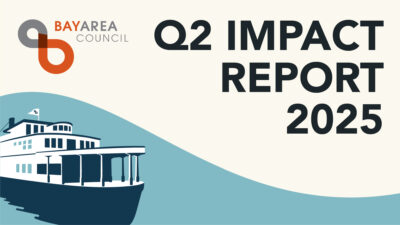California Businesses Launch Major New Climate Resilience Initiative
The Bay Area Council today launched the “California Climate Challenge,” a major new initiative to strengthen California’s resilience to climate change. The statewide challenge will attract resources from across the business community to support research, planning, and implementation of community-level resilience projects and policies focused on California’s water, energy and telecommunications infrastructure, as well as its natural ecosystems and the wildland-urban interface.
The effort is being jumpstarted with a $1 million contribution from PG&E Corporation to the Bay Area Council Foundation. The total amount raised through the challenge – and final details on its scope – will be announced in concert with the Global Climate Action Summit in San Francisco in September 2018. PG&E’s contribution will come from its shareholders, not its customers.
“California’s business climate is inseparable from its actual climate,” said Jim Wunderman, President and CEO of the Bay Area Council. “Much of California’s infrastructure was built under a colder, wetter, more predictable climate than we have today. Protecting our homes and employment centers from extreme weather events, such as droughts, floods and wildfires, requires a top-to-bottom assessment of our existing resilience, and fresh thinking on how to best adapt.”
“We are already experiencing the reality of climate change in California,” said Geisha Williams, CEO and President of PG&E Corporation. “PG&E is incorporating this ‘new normal’ into how we manage risks, plan, and invest our resources. But our collective response to extreme events such as the tragic North Bay firestorms must go beyond the immediate work of rebuilding what was lost. A focus on resilience will strengthen our communities for the future.”
“We applaud this initiative to fund a public-private partnership for climate resilience in California,” said Mindy Lubber, CEO of Ceres, a leading sustainability non-profit organization. “Businesses are concerned about climate risks, which have the potential to cause wide-ranging disruptions to their operations and supply chains. Corporate support for tackling climate change is only growing stronger, and companies clearly see the benefit of staying ahead of the game and doing their part.”
Need for Action
Climate change will push California’s already volatile weather system to further extremes, increasing the frequency and severity of droughts, heat waves, flooding, and wildfires, and drive longer-term changes such as rising sea levels. California’s recent drought included the driest three-year period in the state in 1,200 years, including the hottest year ever recorded. Conversely, Northern California just experienced the wettest “water year” in its recorded history, resulting in severe infrastructure damage at California’s largest reservoir. According to the U.S. Forest Service, more than 100 million trees have died in California since 2010 and Cal Fire’s budget has increased by 45 percent since 2014 to address successive record wildfire seasons.
The California Department of Water Resources predicts the Sierra snowpack, which accounts for over a third of California’s total water supply, will decline by up to 65 percent by the end of this century, straining California’s farms, cities and ecosystems. On our coastlines, sea levels at the Golden Gate are projected to rise 6-13 inches by 2050, on top of the eight-inch rise measured in the 20th century. According to a study from the Bay Area Council Economic Institute, the Bay Area alone could suffer over $10 billion in damages (about the same as Loma Prieta earthquake) during an extreme storm under current sea levels.
These and other changes have the potential to negatively impact the health and safety of communities throughout the state, and undermine California’s economic prosperity. California companies are integral to the sustainability of the communities they serve — and have a unique responsibility to help them prepare for, withstand and recover from extreme events caused by climate change.





